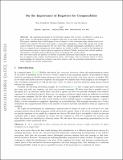On the Importance of Registers for Computability
Author(s)
Gelashvili, Rati; Ghaffari, Mohsen; Li, Jerry Zheng; Shavit, Nir N.
DownloadShavit_On the importance.pdf (333.2Kb)
OPEN_ACCESS_POLICY
Open Access Policy
Creative Commons Attribution-Noncommercial-Share Alike
Terms of use
Metadata
Show full item recordAbstract
All consensus hierarchies in the literature assume that we have, in addition to copies of a given object, an unbounded number of registers. But why do we really need these registers?
This paper considers what would happen if one attempts to solve consensus using various objects but without any registers. We show that under a reasonable assumption, objects like queues and stacks cannot emulate the missing registers. We also show that, perhaps surprisingly, initialization, shown to have no computational consequences when registers are readily available, is crucial in determining the synchronization power of objects when no registers are allowed. Finally, we show that without registers, the number of available objects affects the level of consensus that can be solved.
Our work thus raises the question of whether consensus hierarchies which assume an unbounded number of registers truly capture synchronization power, and begins a line of research aimed at better understanding the interaction between read-write memory and the powerful synchronization operations available on modern architectures.
Date issued
2014Department
Massachusetts Institute of Technology. Department of Electrical Engineering and Computer ScienceJournal
Principles of Distributed Systems
Publisher
Springer-Verlag
Citation
Gelashvili, Rati, Mohsen Ghaffari, Jerry Li, and Nir Shavit. “On the Importance of Registers for Computability.” Principles of Distributed Systems (2014): 171–185.
Version: Author's final manuscript
ISBN
978-3-319-14471-9
978-3-319-14472-6
ISSN
0302-9743
1611-3349